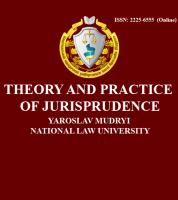Мотив порушення рівноправності громадян залежно від їх расової, національної належності, релігійних переконань, інвалідності та за іншими ознаками
The motive is a violation of the equality of citizens, depending on their race, nationality, religious beliefs, disability and other grounds
Author(s): V.V. KurafieievSubject(s): Law, Constitution, Jurisprudence, Human Rights and Humanitarian Law, Governance
Published by: Національний юридичний університет імені Ярослава Мудрого
Keywords: subjective side of the crime; the motive for the crime; hatred; enmity; dislike; race; nation; religion; crimes against the constitutional rights of citizens;
Summary/Abstract: The article explores the forms of motives as an obligatory sign of the subjective side of the offense provided for in Art. 161 of the Criminal Code of Ukraine.In particular, the motives of hatred or enmity give the act a different qualitative characteristic related to the violation of the principle of constitutional equality of citizens regardless of their biological and social characteristics. Violation of this principle means that it has discrimination, which is prohibited in any form by the norms of international and national law.The illegibility of the legislative design art. 161 of the Criminal Code of Ukraine on the definition of the motive of this crime is one of the reasons for its lack of application in practice.The legal definition of the motives of hatred and enmity is assessed, subjective. These motives are specific in their socio-psychological content. It is hardly possible to find any other motive, which from the point of view of its inner essence and form of manifestation would be so diverse and would cause such difficulties in the definition.Hatred (enmity) as the motive of the crime provided for in Part 1 of Art. 161 of the Criminal Code of Ukraine, has different shades: political, ideological, racial, national, religious, and hatred (enmity) with respect to certain social groups.Religious hatred or enmity is connected, first of all, with intolerance to believers of other religious confessions, which the guilty person perceives hostilely, being based on erroneous creeds and ideas. However, it can also manifest itself in a strong dislike for the victim because of his atheistic worldview or belonging to the agnostic.As a result of the study, motivated by racial, national, religious hatred and enmity, it is suggested to understand internal motives expressing a strong dislike for a certain race, nationality, religious denomination and cause the perpetrator to cause physical, material or moral harm to the victim in connection with his attitude towards religion, belonging to a particular race or nationality
Journal: Теорія і практика правознавства
- Issue Year: 1/2018
- Issue No: 13
- Page Range: 1-14
- Page Count: 14
- Language: English, Russian, Ukrainian

